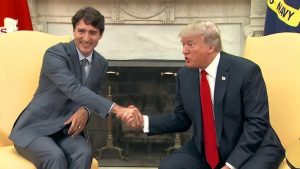**Finance Minister LeBlanc and Foreign Minister Joly aim to strengthen ties with the incoming Trump administration while addressing economic and security concerns.**
**Canada's Cabinet Ministers Meet Trump Administration Amid Trade and Border Security Tensions**

**Canada's Cabinet Ministers Meet Trump Administration Amid Trade and Border Security Tensions**
**Critical discussions in Palm Beach focus on tariffs, migration, and cross-border drug trafficking.**
Two high-ranking Canadian ministers, Finance Minister Dominic LeBlanc and Foreign Minister Mélanie Joly, have embarked on a pivotal trip to Palm Beach, Florida, to engage in crucial discussions with the soon-to-be Trump administration. This meeting comes as worries mount regarding border security, trade implications, and an impending 25% tariff on Canadian goods that could significantly impact both countries’ economies.
The discussions, according to Jean-Sébastien Comeau, spokesman for LeBlanc, are meant to build upon prior dialogues between Prime Minister Justin Trudeau and Donald Trump at Mar-a-Lago. The focus will primarily revolve around Canada’s anti-fentanyl trafficking efforts, illegal migration challenges, and the economic repercussions of potential tariffs on Canadian imports. “The ministers are prepared to articulate Canada's Border Plan and emphasize the negative impact of steep tariffs,” Comeau indicated.
The economic stakes for Canada are substantial, particularly with a billion-dollar initiative already in place to address U.S. concerns regarding drug trafficking and migration. Notably, there is a stark contrast in statistics concerning drug seizures at the Canadian and Mexican borders; fentanyl seizures at the Canadian border amounted to 43 pounds last year, compared to 21,100 pounds at Mexico's border. Despite these figures, Trump has criticized Canada’s border management, often referring to Trudeau in a belittling manner, which signals his administration’s perception of Canada’s role in trade.
Trade relations have increasingly grown complex under Trump’s rhetoric. The U.S. President has repeatedly expressed grievances regarding a supposed trade deficit with Canada, despite conflicting data highlighting Canada’s significant contributions to U.S. energy imports. Kirsten Hillman, Canada’s ambassador to Washington, has emphasized that Canadian energy, amounting to 60% of U.S. crude oil imports and 85% of electricity imports, plays a crucial role in U.S. consumption. Daily, goods worth nearly $3.6 billion transit the shared border, reinforcing Canada as a prime export destination for a majority of U.S. states.
Migration statistics further complicate the border narrative; the U.S. Border Patrol recorded over 1.5 million migrant encounters at the southern border last fiscal year, contrasted by only 23,721 at the Canadian border. Yet, LeBlanc and Joly’s agenda includes underscoring Canada’s dedication to addressing U.S. concerns via their Border Plan, which stresses curbing illegal migration and drug trafficking issues.
As discussions loom, LeBlanc expressed cautious optimism about the upcoming negotiations, recognizing both opportunities for progress and formidable challenges ahead. “We've made strides with American officials, but significant work remains,” he stated recently. As these Canadian ministers navigate sensitive discussions in Palm Beach, the outcome could have profound implications for the trajectory of U.S.-Canada relations, with a shared urgency to establish cooperation amidst rising economic and geopolitical tensions.





















